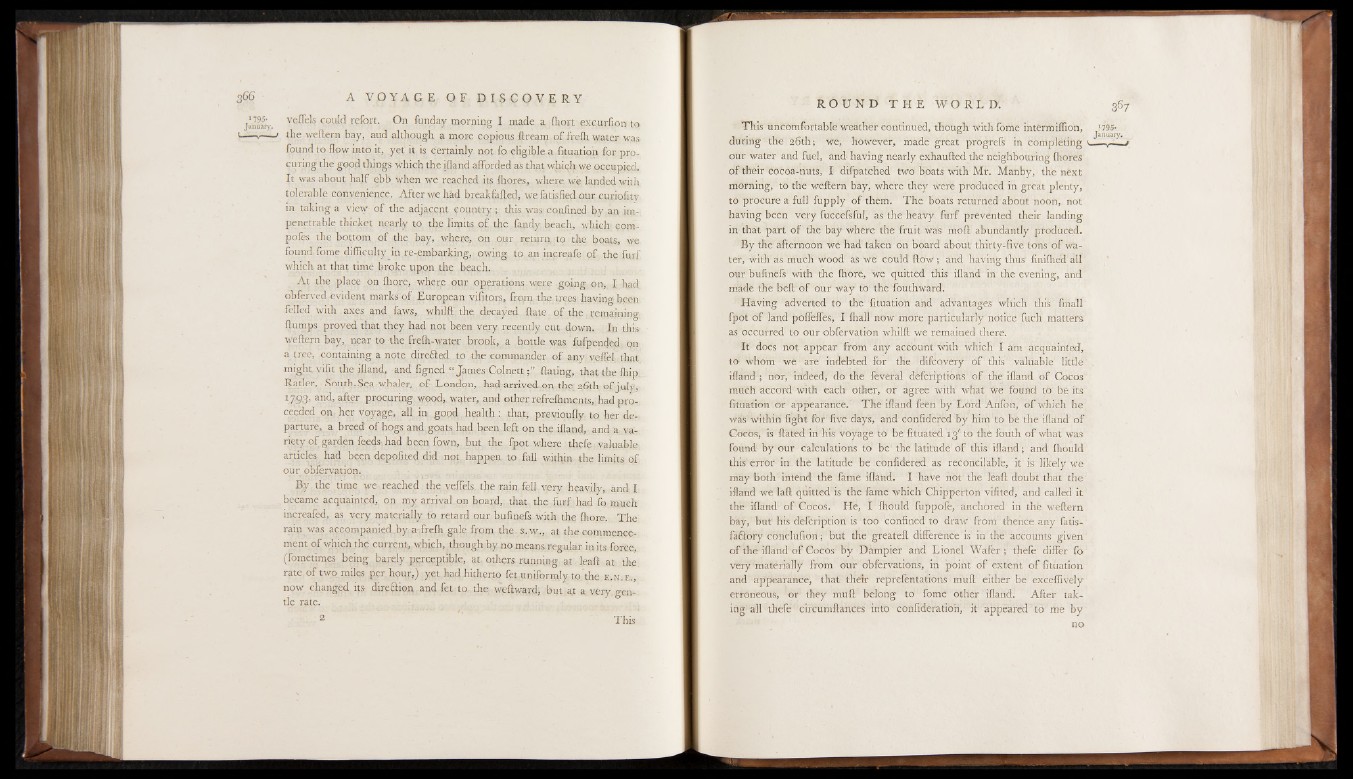
3 6 6 A V O Y A G E OF D I S C O V E R Y
Januiuy Ye$bls could retort. On funday morning I made a fhort excurfion to
<---,— -> the wellern bay, aud although a more copious ftream of freth water was
found to flow into it,., yet if is, certainly not fo.eligible a fituation for pro,
curing the goo.d things which the ifland afforded as that which -we occupied.
It was about half ebb when we reached its -{bores, where we landed with
tolerable convenience. After we had breakfafted, we fatisfied our curiofity
in taking a view- of the adjacent country ; this was- confined by an impenetrable
thicket, nearly to the limits of the Tandy beach, which- pom-
poles the bottom, of the bay, where, on our i;eturn, to "the boats, we
found, fome difficulty in re-embarking, - owing to an increafe of die fluff
which at that time. broke, upon the beach-
At the place on fliQ.re, where our operations.were going on, I had
obferved. evident marks of European vifitors, from, the trees' having been
felled with axes and faws, whilff the decayed flate. of the rem.ainino-
ftumps proved that, they had not been very recently cut down. In this-
wellern bay, near to the frefr. -water brook, a bottle was fufpended on
a tree, .containing, a note directed to the commander of any. ve-flel, that
might vifit the ifland, and figned “ James GolnettHating, that the {hip
Rader, SouthrSea whaler, of London, had arriveckon the 26th ofjuly,
[/.a:-!’ and, after procuring wood,, water, and other refrelhments, had proceeded
on her voyage, all in good health: that; previously to her departure,
a breed of hogs and goats had beendeft on the ifland, and a variety
of garden.feeds-. had been fown, but the fpo.t where t-hefe valuable
articles had been depofited did not, happen to, fall within the limits of,
our obfervation.
By, the time >ve-.reached the veffels. the rain, fell very heavily, and I
became acquainted,, op my arrival on board, that, the furf had fo much
inereafed, as very materially to. retard our hufinefs with the fhore. The
rain was accompanied .by, a-frelh gale.from the. s;.w., at the commencement
of which.the.current, whiph,. thoughhy.no means.; regular in its force.,
(fometimps being, barely.perceptible, at. others running at leaf! at the.
rate,of two miles per.hpur,) .yet had,hitherto fet,uniformly to. the e ..n . e „,
now changed, its direfl-iop and fet to the, weft ward; but. a* a. very, .gentle
rate.
This
R O U N D T HE WORLD. 367
This uncomfortable weather continued, though with fome intermiflion, !795-
. l ' - IM O i 1 i 0 . ' . January. during thé 20th; we, however, made great progrefs in completing v__/
our water and fuel, and having nearly exhaufted the neighbouring Ihores
of their cocoa-nuts, I difpatched two boats with Mr. Manby, the next
morning, to the weffern bay, where they Were produced in great plenty,
to procure a full fupply of them. The boats returned about noon, not
having been very fuccefsful, aS the heavy furf prevented their landing
in that part of the bay whère the fruit was' moll abundantly produced.
By the afternoon we had taken on board about thirty-five tons of water,
with as much wood as we could ficrw; and having thus finilhed all
our bufinefs with the fhore, we quitted this ifland in the evening, and
made the beft of our way to1 the fouthward.
Having adverted to the fituation and advantages which this fmall
fpot of land poffefles; I fhall now more particularly notice fuch matters
as occurred to our obfervation whilft we remained there.
It doés not appear from any account'with which I am acquainted,
to whom we are indebted for the difcovcry óf this valuable little ,
ifland; nor, indeed, do the feveral defcriptions of the ifland of Cocos
much accord with each other, or agree with what we found to be its
fituation . or appearance/' The ifland feëri by LoiffTAnfon, off which he
was'with in fight for five days, and confidered by him to be the ifland of
Cocös, is Hated in his voyage to Be lituated 13' to the fouth of what was
found by our calculations to be the latitude of this ifland; and fhould
this' error in.. the latitude1 be confidered. as reconcilable, it is likely we-
may both intend the fame ifland. I have not the leaft doubt that the'
ifland we laft quitted is the fame which Chipperton vifited, and called it
the ifland off Cocos. He, I Ihould fuppofe, anchored in the wellern
bay, but" his defcriptiori is too confined to draw from thence any fatis-
faflory conclufion; but the greateft difference is in the accounts given
of the ifland of Cocos by Dampier and Lionel Wafer; thefe differ fo
very materially from our obfervations, in point of extent of fituation
and -appearance, that their reprefentations mull either be exceflively
erroneous, or they mull belong to fome other ifland; After taking
all thefe circumftances into confideration, it appeared to me by
no